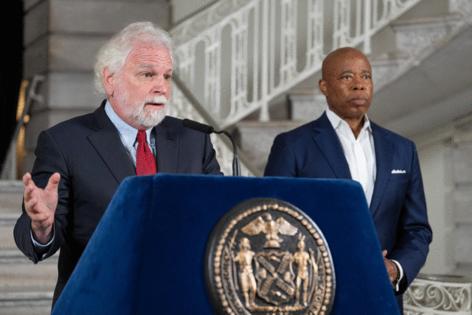Developers sue NYC Mayor Eric Adams over 'lawless' move to block Elizabeth Street Garden housing plan
Published in News & Features
NEW YORK — The developers selected to build an affordable housing complex on the site of Manhattan’s Elizabeth Street Garden sued Mayor Eric Adams and his top deputy, Randy Mastro, on Wednesday over their attempt to block the project by designating the site as “parkland.”
The lawsuit, brought by a consortium of developers and social services providers tapped to oversee the long-stalled project, is asking a Manhattan Supreme Court judge to immediately impose a temporary restraining order barring the designation from becoming official.
Specifically, the plaintiffs charged Adams and Mastro, his first deputy mayor, violated the city’s so-called ULURP land use process by taking the unusual step earlier this month of declaring the Nolita garden parkland, a step that would effectively prohibit construction on the site.
Under a ULURP application approved by the City Council, the site has for almost a decade been earmarked for building 123 apartment units for low-income seniors, and the lawsuit says the parkland designation doesn’t override that.
“This was a lawless act,” the suit charges of the parkland order from Adams and Mastro.
Referencing the Daily News’ reporting on Mastro’s connections to some prominent opponents of the garden transformation, the plaintiffs alleged the maneuver from him and Adams — who is leaving office Jan. 1 — amounts to a attempt at stymying incoming Mayor Zohran Mamdani, who said he wanted to stick with the original plan and finish the development.
“[The designation] was done — without any advance notice nor warning to Petitioners, despite ongoing conversations between Petitioners’ representatives and senior members of the Adams administration — to prevent the incoming mayor from implementing the project and to deliver by unlawful fiat an unearned victory to the well-heeled private interests that had fought Haven Green from the start,” says the suit, brought by Pennrose, Habitat For Humanity and Riseboro, the entities previously tapped by the city to build and run the senior housing.
In a statement, Mastro said the Adams administration’s designation was legal and argued it will ensure the garden — which is currently run by a private nonprofit that determines hours of opening and closing — will become open to the public.
“It is unfortunate that these developers have now brought a frivolous lawsuit to try to leverage a better deal in negotiations with the city,” Mastro’s statement said. “The city has followed all proper procedures to designate this site as parkland, and this is a meritless lawsuit that does not have New Yorkers’ best interest in mind.”
A Mamdani spokeswoman didn’t immediately return a request for comment on the new lawsuit.
Adams and his administration were for years major backers of the redevelopment plan, which involves building the housing for seniors while also preserving parts of the beloved greenspace. But after Mastro came onboard as Adams’ top deputy, the mayor announced he was opposing the development.
As mayor, Adams has made it one of his major focuses to build more apartments at a time that the city’s reeling from a severe housing crisis, and critics say his reversal on the Elizabeth Street Garden was hypocritical.
Adams and Mastro have countered they have secured other sites in nearby neighborhoods for developing affordable housing. But those sites would need to undergo the city land use process, which can take years, whereas the Elizabeth Street Garden site is available for immediate development.
In their suit, the Elizabeth Street Garden developers and housing providers argued that not blocking the parkland designation would be “dangerous.”
“If allowed to stand, Respondents’ actions would establish dangerous precedents: that the Mayor, or any mayoral agency, could unilaterally overturn a completed ULURP by executive fiat; that a land-use decision duly vetted, debated, and approved by the City Council may be silently reversed without public process; and that the rule of law governing New York City’s land-use system can be disregarded and displaced by political convenience and preference,” the suit says.
“That is not what the City Charter mandates, and it is not how a lawful government functions.”
_____
©2025 New York Daily News. Visit at nydailynews.com. Distributed by Tribune Content Agency, LLC.







Comments